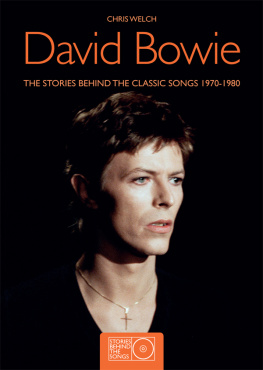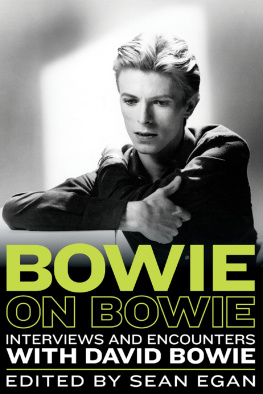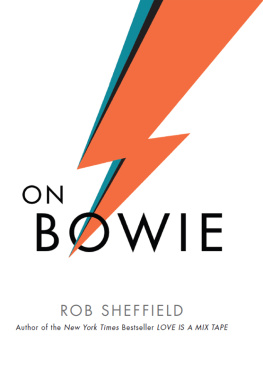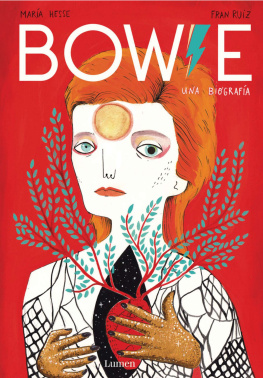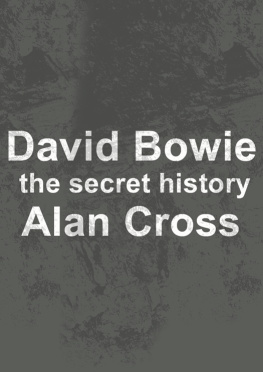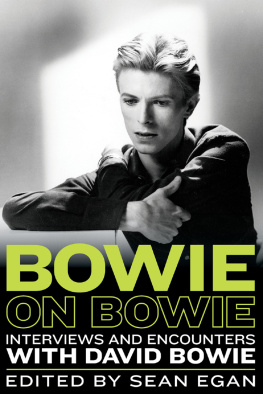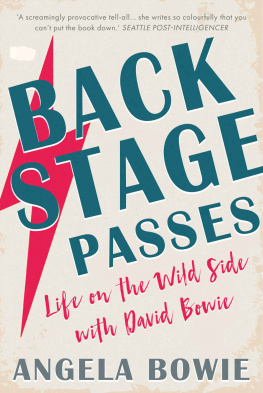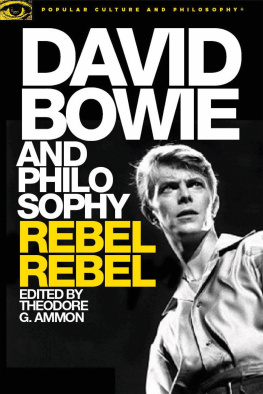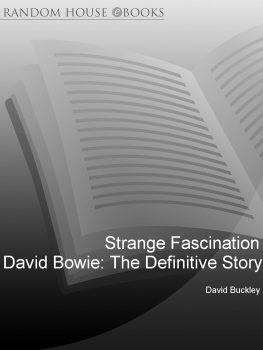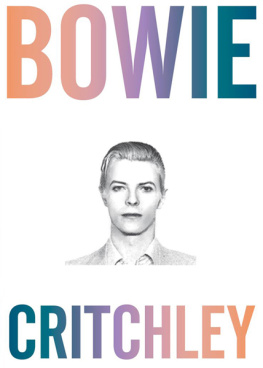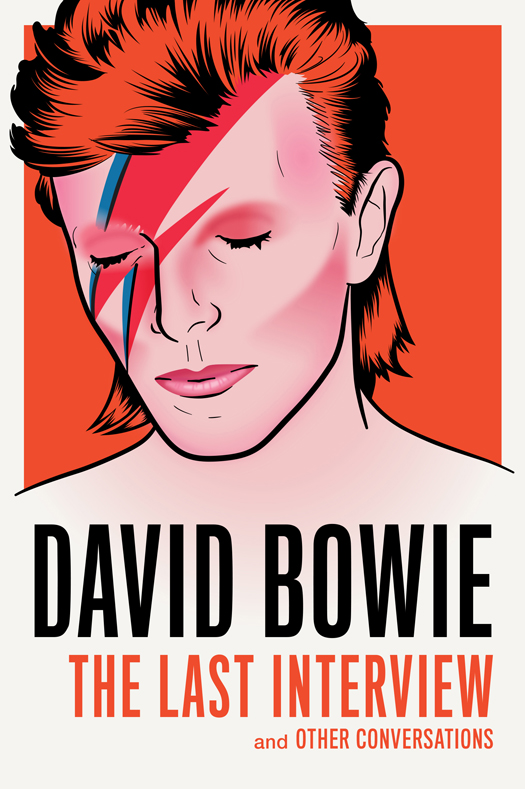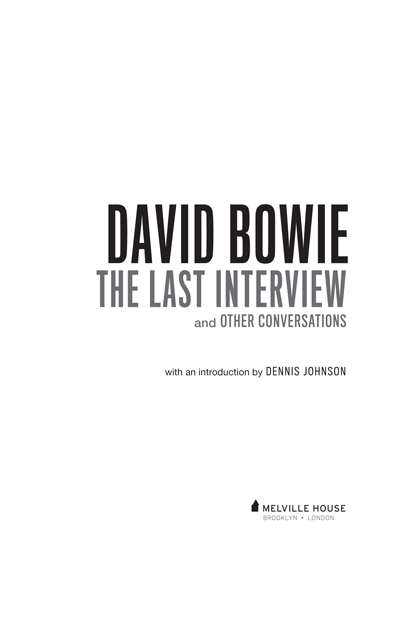DAVID BOWIE: THE LAST INTERVIEW AND OTHER CONVERSATIONS
Copyright 2016 by Melville House Publishing
Introduction 2016 by Melville House Publishing, LLC
First Melville House printing: November 2016
The First Interview 1964 by the BBC. Transcript made by Melville House Publishing from BBC television program Tonight, originally aired November 1964
David Bowie Tells All and More 1973 by Patrick Salvo.
First published in Interview, March 1973
Beat Godfather Meets Glitter MainMan 1973 by Craig Copetas.
First published in Rolling Stone, February 28, 1974
David Bowie: Stardust Memories: Reflections on a Life of Wit and Style
1987 by Kurt Loder. First published in Rolling Stone, April 23, 1987
Bowie at the Bijou 1992 by Movieline, a publication of Variety and Deadline.
First published in Movieline Magazine, April 1, 1992
Fashion: Turn to the Left; Fashion: Turn to the Right 2005 by Dazed and Confused. First published in Dazed and Confused, November 1996
Busts Interview with David Bowie 2000 by Bust Magazine. Originally published by Bust Magazine as Busts Interview with David Bowie, Fall 2000
As the Artist Said to the Rock Star 2001 by Tracey Emin.
First published in The Guardian, July 18, 2001
The Last Interview 2006 by Ricky Gervais and Stephen Merchant.
Transcript made by Melville House Publishing from Extras, episode 8, originally aired September 21, 2006
Every reasonable effort has been made to trace the owners of the copyright for The Raw and Uncut Interview, but this has proven impossible. The editors and publishers will be glad to receive any information leading to more complete acknowledgments for subsequent printings of this book.
Melville House Publishing
46 John Street
Brooklyn, NY 11201
and
8 Blackstock Mews
Islington
London N4 2BT
mhpbooks.com facebook.com/mhpbooks @melvillehouse
EBOOK ISBN: 978-1-61219-576-6
Library of Congress Control Number: 2016953423
v3.1
CONTENTS
Interview by Cliff Michelmore
BBC Tonight
November 1964
Interview by Patrick Salvo
Interview
March 1973
William Burroughs, Say Hello to David Bowie
Interview by Craig Copetas
Rolling Stone
February 28, 1974
Vox Pop
March 18, 1987
Reflections on a Life of Wit and Style
Interview by Kurt Loder
Rolling Stone
April 23, 1987
Interview with Virginia Campbell
Movieline
April 1, 1992
Conversation with Alexander McQueen
Dazed and Confused
November 1996
Interview by Iman
Bust Magazine
Fall 2000
Conversation with Tracey Emin
The Guardian
July 18, 2001
BBC Extras
September 2006
INTRODUCTION
DENNIS JOHNSON
David Bowie gave a lot of interviews until he didnt.
From the start of his career, he was regularly interviewed not just by trade publications but by mainstream media, probably because yes, he was quirky even by 60s standards, but also because he was such a refreshingly articulate and interesting thinker, with a charming and wry sense of humora man who made for a good, in-depth talk. In fact, Bowies first interview, included here, which occurred in 1964 when he was still going by his given name David Jones, shows off his mature media savvy and wit perfectly, even though he was only sixteen at the time. It was his first public assumption of a character: He convinced the BBC that he represented a group of young men (in reality, his friends) who were feeling persecuted by society because they had long hair. It was a gag, but Bowie and his mates played it straight with their jovially condescending interlocutor And beyond the clever character pose, a truly hip public persona was born.
So hip, in fact, that Bowie deftly avoided becoming a media fixture. Throughout the initial explosion of famethe Ziggy Stardust and Aladdin Sane yearshe seemed to toe the line perfectly between being available and not being available, such that he was always a big get for a journalist, deserving of cover treatment. Not that he was catty once he sat down to talk, though. As shown in the two interviews from the early 1970s included here, he was nothing if not candid and open, often self-critical, and always intelligent and witty. He had a ready laugh and didnt hesitate to admit his working-class background, to discuss his brothers mental-health issues, or, for that matter, to risk criticism of important industry personagessuch as influential DJ John Peel. In short, he seemed to have nothing to hide, and to be genuinely interested in speaking in depth to his audience.
Perhaps such thoughtful interviews were more work than they seemed, or at least more deeply distracting, because Bowie stopped giving interviews almost entirely for a spell in the late 1970s during his sojourn in Berlinwhen, by his own standards, he made his favorite recordings. Those were radically different recordings, with a sound not geared for pop radio. Whats more, by his own admission, he was trying to quit drugs during that period. Whatever the reason, he let the music speak for itself.
It wasnt long, though, before he resumed making himself accessible to the press again, particularly as he supported various new albums. But theres something about those interviewssuch as Kurt Loders insightful 1987 interview, or Bowies look back at his film career in a Movieline chat, or his discussion with Vox Pop of the influence of John Lennon on his writing, all included herethat seem somehow wiser and sager, more contemplative, and reflective of a reputation to be confirmed or denied. Simply, hed become a man who clearly felt it was incumbent upon him as an artist to be as open as he could be, even to such intense public scrutiny yet felt it was also incumbent upon him to protect the mystery inherent in any art-making career.
All of which made for a rush of great interviews over the following decades. Bowie, ever the searcher, seemed to embrace the idea of the interview itself as an experimental form. This may be what led him, during this time, to a string of spirited interviews shared with other artists, or interviews of other artists conducted by Bowie himself. Hed shared the spotlight this way sporadically throughout his careersuch as in Craig Copetass marvelous 1974 interview for Rolling Stone, included here, of both Bowie and William Burroughs. But during the 1990s and into the 2000s, Bowie loved talking to other kinds of artists and drawing them out on pet subjects, as in his interviews here with fashion designer Alexander McQueen and visual artist Tracey Emin or pet peeves, as in his talk with his own wife, supermodel Iman, wherein he explains his problems with feminism.
But the questing loquaciousness stopped abruptly in 2004 when Bowie had a heart attackwhile onstage, no less, although he hid it and finished the show. After that, his biographers agree, he basically stopped giving not only performances but interviews as well. At least, in the way of traditional-format interviews.


